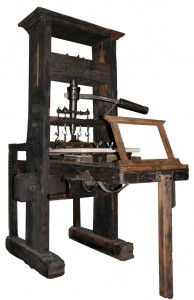Though Germany has made many contributions to journalism, none are comparable to the invention of Johannes Gutenberg. Though printing presses were already a popular technology at the time, the simple invention of movable type would change the world.
Before Gutenberg’s invention, printing was both a time consuming and incredibly expensive process. In fact, during Gutenberg’s time, books were considered a sign of wealth and position in society.
The only people who could afford books were no
bility, rich merchants, and the church. Due to the fact that books were such a rare commodity at the time, the overwhelming majority of the population of the time was illiterate.
Movable type would solve both of these issues in a matter of decades. Most importantly, movable type made printing much more affordable for individuals or groups who wanted to spread their messages.
With the increase in publication came an increase in literacy. Magazines and newspapers were not mass produced before moving type both because of the cost and the lack of an audience, but the more books and other reading material became available, the larger the markets for newspapers and magazines grew.
 So not only did movable type help create the newspapers and magazines we read today, but it also helped encourage literacy among the general populace. We can see the effects of this achievement less than a century after it’s invention in the case of another German, Martin Luther.
So not only did movable type help create the newspapers and magazines we read today, but it also helped encourage literacy among the general populace. We can see the effects of this achievement less than a century after it’s invention in the case of another German, Martin Luther.
Without Gutenberg’s printing press, Martin Luther’s 95 Theses likely would not be talked about today, as it would have been a discussion within the church only. However with the ability to mass replicate the 95 theses, the message spread like wildfire, and as a result Martin Luther was not able to be silenced.
We see an example of how far his message traveled as he is on his way to the Diet of Worms. As Martin Luther was making his way to Worms, he was approached by many common people who praised both him and his work. If he had been born a century earlier, Martin Luther’s message would likely never have reached these individuals, and even if it had, the majority would be unable to read it.
Overall, movable type not only helped create the forms of mass media we see today, but also helped create an audience to consume that media. Without Gutenberg and his invention, journalism as we know it today would not be possible.

Leave a response